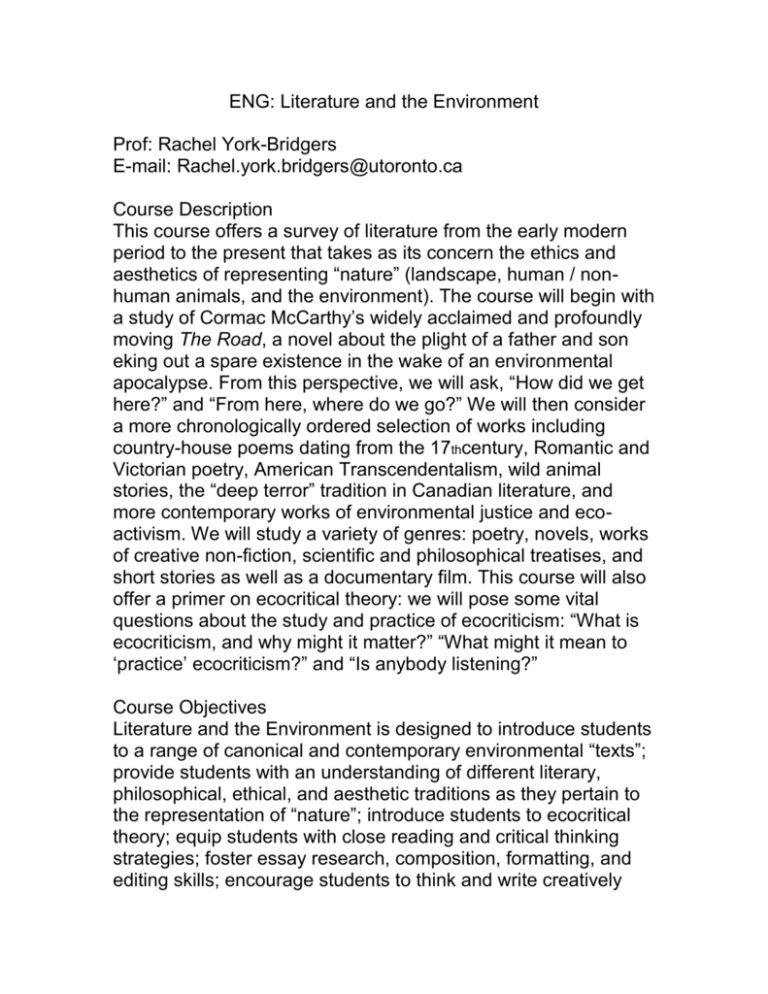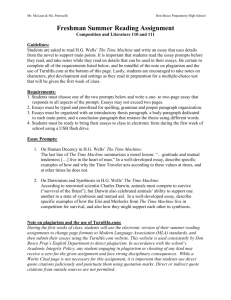Literature and the Environment
advertisement

ENG: Literature and the Environment Prof: Rachel York-Bridgers E-mail: Rachel.york.bridgers@utoronto.ca Course Description This course offers a survey of literature from the early modern period to the present that takes as its concern the ethics and aesthetics of representing “nature” (landscape, human / nonhuman animals, and the environment). The course will begin with a study of Cormac McCarthy’s widely acclaimed and profoundly moving The Road, a novel about the plight of a father and son eking out a spare existence in the wake of an environmental apocalypse. From this perspective, we will ask, “How did we get here?” and “From here, where do we go?” We will then consider a more chronologically ordered selection of works including country-house poems dating from the 17thcentury, Romantic and Victorian poetry, American Transcendentalism, wild animal stories, the “deep terror” tradition in Canadian literature, and more contemporary works of environmental justice and ecoactivism. We will study a variety of genres: poetry, novels, works of creative non-fiction, scientific and philosophical treatises, and short stories as well as a documentary film. This course will also offer a primer on ecocritical theory: we will pose some vital questions about the study and practice of ecocriticism: “What is ecocriticism, and why might it matter?” “What might it mean to ‘practice’ ecocriticism?” and “Is anybody listening?” Course Objectives Literature and the Environment is designed to introduce students to a range of canonical and contemporary environmental “texts”; provide students with an understanding of different literary, philosophical, ethical, and aesthetic traditions as they pertain to the representation of “nature”; introduce students to ecocritical theory; equip students with close reading and critical thinking strategies; foster essay research, composition, formatting, and editing skills; encourage students to think and write creatively about their personal experiences of and interactions with “nature”; facilitate student-instructor discussion in the classroom; facilitate student-student discussion in the classroom and online. Required Reading Cormac McCarthy, The Road (Vintage) Don LePan, Animals (Broadview) J.M. Coetzee, The Lives of Animals (Princeton U P) Indra Sinha, Animal’s People (Simon & Schuster) Derrick Jensen and Stephanie McMillan, As The World Burns: 50 Things You Can Do to Stay in Denial (Seven Stories Press) Course Texts All texts are available at the UTM Bookstore (South Building, lower level). I have also arranged for one copy of each text to be put on short-term loan; consult the UTM library for borrowing periods. Second-hand texts are permitted, but do keep in mind that page references often differ from edition to edition. Coursepacks will be available for purchase the third or fourth week of classes through the UTM Bookstore; photocopies or URLs to online texts will be provided until the coursepacks come in. Supplementary Reading Joseph Gibaldi, MLA Handbook for Writers of Research Papers (seventh ed.) Abrams, M.H. A Glossary of Literary Terms (ninth ed.) Kane, Thomas S. and Heather Pyrcz. The Canadian Oxford Guide to Writing: A Rhetoric and Handbook (second ed.) If you intend to continue on in English, you may consider purchasing the supplementary texts; otherwise, please refer to the reference copies at the UTM library as required. Method of Evaluation Participation 10% Article critique Jan. 31 10% Ghost Bird report Feb. 28 15% Research Essay Mar. 14 30% Final exam 35% Late Policy Assignments: Late assignments will not be accepted; assignments must be submitted in class on the day they are due, except in cases of sudden or severe illness (for appropriate documentation, see note on obtaining a UTM medical certificate below). Essays: Essays are to be submitted in class on the day they are due. A penalty of 1% per day (including weekends) will be levied for all essays received after the due date, except in cases where a UTM medical certificate is provided. (For a copy of the certificate, go to “External Links” in Blackboard). If you are unable to attend class, you may leave your essay in the English drop box on the 2nd-floor stair landing. Note, however, that the late penalty in such cases will be levied according to the date the electronic version of the same essay was uploaded to Blackboard. Do not e-mail your essay to me and do not slide late essays under my office door. You are expected to submit an electronic copy of your essay to Turnitin.com on the due date (see note on academic integrity below). Essays submitted to Turnitin.com will not usually be graded; you should consult the TA to ask if a hard copy of your paper is also required. Drop Policy Please note that the last day to drop winter (S) courses from your academic record and GPA is Mar. 10th. By that time, you will have received back your graded creative writing exercise (valued at 15%). UofT Portal It is the student’s responsibility to monitor the English 259H5FLEC0101 website regularly. Discussion questions, assignments, announcements, grades, contact information for your instructor, and other course-related materials will be posted on the website. Be sure to check the Portal before class to ensure that you bring the correct texts and / or handouts. Course URL: http://portal.utoronto.ca In order to access the Portal, you will need a UTORid (printed on your T-Card) and a UTOR e-mail account. To activate your UTORid, go to www.utorid.utoronto.ca Participation Policy Students are expected to have read the assigned text(s) prior to class, bring the assigned material with them, and be prepared to discuss the reading(s). The 10% participation grade will reflect the student’s engaged and respectful participation in class discussion, online discussion, and in-class group work. Academic Integrity Plagiarism—presenting the work or ideas of another person as your own—is a serious academic offense and will not be tolerated by either the instructor or the University. Academic Honesty (reproduced from the UTM Calendar) http://www.utm.utoronto.ca/regcal/WEBGEN87.html Honesty and fairness are considered fundamental to the University's mission, and, as a result, all those who violate those principles are dealt with as if they were damaging the integrity of the University itself. When students are suspected of cheating or a similar academic offence, they are typically surprised at how formally and seriously the matter is dealt with - and how severe the consequences can be if it is determined that cheating did occur. The University of Toronto treats cases of cheating and plagiarism very seriously. Examples of offences for which you will be penalized include (but are not limited to): ·Using any unauthorized aids on an exam or test (e.g., "cheat sheets", etc.) ·Representing someone else's work or words as your own plagiarism ·Falsifying documents or grades ·Purchasing an essay ·Submitting someone else's work as your own ·Submitting the same essay or report in more than one course (without permission) ·Looking at someone else's answers during an exam or test ·Impersonating another person at an exam or test or having someone else impersonate you ·Making up sources or facts for an essay or report. As a student it is your responsibility to ensure the integrity of your work and to understand what constitutes an academic offence. If you have any concerns that you may be crossing the line, always ask your instructor. Your instructor can explain, for example, the nuances of plagiarism and how to use secondary sources appropriately; he or she will also tell you what kinds of aids - calculators, dictionaries, etc. - are permitted in a test or exam. Ignorance of the rules does not excuse cheating or plagiarism. All students should also consult Margaret Proctor’s essay, “How Not to Plagiarize,” which can be found at http://www.utoronto.ca/writing/plagsep.html. In the interests of promoting academic integrity, the instructor requests that all students submit (in addition to a hard copy) an electronic copy of each essay to the Turnitin.com website: http://www.turnitin.com/static/index.html. You will need to create a student account prior to submitting an essay to Turnitin.com. When registering as a new user, cite the class ID # and password listed below. class ID #: 5913270 password: litenviro Please also review carefully the following policy: Normally, students will be required to submit their course essays to Turnitin.com for a review of textual similarity and detection of possible plagiarism. In doing so, students will allow their essays to be included as source documents in the Turnitin.com reference database, where they will be used solely for the purpose of detecting plagiarism. The terms that apply to the University's use of the Turnitin.com service are described on the Turnitin.com web site. E-Culture Policy ·All e-mail correspondence will be sent to your University of Toronto e-mail account, so you will need to ensure that you check that account regularly. Your UTOR e-mail can also be forwarded to another e-mail account; for instructions, go to https://www.utorid.utoronto.ca/ . ·For all queries, the subject line of your e-mail should indicate clearly the topic of your message / question and must include the course number (e.g. “Essay assignment, ENG259H5F”). The body of your e-mail must include your full name. ·I will attempt to respond to e-mails within 48 hours. If you do not hear back from me within that time, resend your message to ensure that I received it. ·The instructor is available to assist students with their assignments, but students must observe the following guidelines: E-mail queries regarding should be submitted well in advance of the essay due date; do not expect to get an immediate response to a last-minute e-mail. Student Conduct ·Essays should be submitted at the beginning of class. If you arrive at the end of class to submit your essay, do not interrupt; please wait in the hall until class is dismissed. ·No student may pick up work on behalf of another student. ·If a student misses a class, it is his / her responsibility to review the missed material with a classmate; the instructor is not responsible for reviewing the subject of the missed class, and lecture notes will not be posted or otherwise circulated. Academic Resources The Robert Gillespie Academic Skills Centre (Room 390, Hazel McCallion Academic Learning Centre) offers a range of workshops, seminars and individual consultations to help students develop the academic skills they need for success in their studies. For further information or to make an appointment, visit the Centre’s website at www.utm.utoronto.ca/asc or contact them at 905-828-3858. AccessAbility PolicyStudents with diverse needs are welcome in this course. Students with questions about disability / health accommodations are encouraged to contact their instructor and / or the UTM AccessAbility Resource Centrewhen the course begins. The AccessAbilityResource Centre staff can be contacted by phone (905-569-4699), e-mail (access@utm.utoronto.ca), or in person (Room 2047, South Building). Assessment Criteria Please refer to the assessment criteria for short assignments and essays posted on the course website. In addition, a comprehensive grading rubric will be attached to your graded essays. Course Calendar Jan. 10 Introduction and Overview: Bressler, “Ecocriticism” (Blackboard and handout) Leopold, “Good Oak” and “Thinking like a Mountain” (handout) Jan. 17 McCarthy, The Road Jan. 24 Jonson, “To Penshurst” (Blackboard; hereafter “Bb”) Gray, “Elegy Written in a Country Churchyard” (Bb) Wordsworth, “Tintern Abbey” (Bb) Jan. 31 Coleridge, “The Rime of the Ancient Mariner” (Bb) Shelley, “Mont Blanc” (Bb) Jeffers, “Hurt Hawks” (Bb) Article Critiques Due Feb. 7 Thoreau, “Walking” (Bb) Austin, “The Land of Little Rain” (Bb) Feb. 14 Film screening: Ghost Bird Feb. 21 READING WEEK Feb. 28 RGASC workshop; Coetzee, The Lives of Animals Ghost Bird Reports Due Mar. 7 LePan, Animals Mar. 14 Alexius, Romantically Apocalyptic http://romanticallyapocalyptic.com/ Author’s Talk by Vitaly S. Alexius Writing Workshop Mar. 21 Carson, “A Fable for Tomorrow” and “Elixirs of Death” (Bb) Williams, “The Clan of One-Breasted Women” (Bb) Walcott, “Ruins of a Great House” Walker, “South: The Name of Home” and “The Right to Life...” (Bb) Essays Due Mar. 28 Sinha, Animal’s People Apr. 4 Jensen and McMillan, As The World Burns Term Review / Exam Preparation




